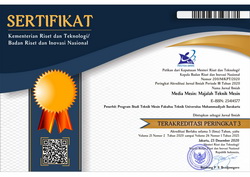THE EFFECT OF TEMPERATURE VARIATION AND VARIOUS METAL MATERIALS ON CONDUCTION HEAT TRANSFER RATE
Handini Novita Sari(1*), Ika Nurjannah(2), I Made Arsana(3), Ghaniy Amirul Dana(4), Moch. Variant Julianto(5)(1) Faculty of Engineering, Mechanical Engineering Study Program Surabaya State University
(2) Faculty of Engineering, Mechanical Engineering Study Program Surabaya State University
(3) Faculty of Engineering, Mechanical Engineering Study Program Surabaya State University
(4) Faculty of Engineering, Mechanical Engineering Study Program Surabaya State University
(5) Faculty of Engineering, Mechanical Engineering Study Program Surabaya State University
(*) Corresponding Author
Abstract
Thermal conductivity is the value of a material's ability to conduct heat. Heat transfer occurs due to the difference in temperature found in an object. Heat transfer can take place in three ways, namely conduction, radiation and convection. The purpose of this study was to determine the conduction heat transfer rate for 3 solid cylindrical materials, namely aluminum, iron, and brass. by varying the temperature 50 ℃, 55 ℃, 60 ℃, 65 ℃, 70 ℃, 75 ℃ and 80 ℃. The working principle in this experiment is to prepare 3 variations of solid cylinders, then place them on a thermal conduction trainer by adjusting the temperature of the test on the thermocontrol display (T1) in stages and the test results are obtained as shown by a digital thermometer (T2). From the test results, the results of the heat transfer rate have been found, for the metal material that has the greatest heat transfer rate is aluminum with a heat rate value of 479.7 Watt at 80 ℃, the second largest heat transfer rate value is aluminum with a heat transfer rate of heat is 299.7 Watt at 80℃ while for the material the smallest rate is found in iron material with a value of 214 Watt at 80℃. The average heat transfer rate for aluminum is 325.5 Watt, for an average heat transfer rate for iron is 147.1 Watt, and the average heat transfer rate of brass is 218.5 Watt.
Keywords
Full Text:
PDFReferences
Nurul, I. R. 2017. “Alat Peraga Pembelajaran Laju Hantaran Kalor Konduksi”. Prosiding Seminar Nasional Fisika dan Pendidikan Fisika (SNFPF) Ke-6 . VI. Surakarta: PMIP FKIP Universitas Negeri Semarang.
Supu, I. 2016. “Pengaruh Suhu Terhadap Perpindahan Panas Pada Material Yang Berbeda”. Jurnal Dinamika, 62 - 73.
Dwi, I. A. 2015. “Rancang Bangun Alat Konduktifitas Thermal Logam”. Prosiding Seminar Nasional Fisika dan Pendidikan Fisika (p. 30). Jakarta: Universitas Indraprasta PGRI.
Maghfiroh, E. R., & Khusnial, R. 2019. “Analisis Numerik Penyebaran Panas Pada Batang Baja 1-Dimensi Menggunakan Skema Beda Hingga Kompak”. Prosiding Seminar Nasional Integrasi Matematika dan Nilai Islami, 152 -159.
Arwizet, K (2014). Ilmu Perpindahan Panas. Padang: UNPPress.
Astuti, I. D. 2015. “Universitas Indraprasta PGRI. Penentuan Konduktivitas Termal Logam Tembaga, Kuningan, dan Besi dengan Metode Gandengan” , Hal. 32-33.
Charles Kittel, H. K. (1980). Thermal Physics.WIT Freman: San Fransisco.
Crankovic, G. M. (1986). Hand Book in Material Characterization.Amerika: ASM.
Cengel, Y.A. (2010). Thermodinamics An Engineering Approach.New York: McGraw-Hill Higher Education.
Ayu, D. 2018. “Rancang Bangun Kit Percobaan Konduktivitas Termal Berbasis Rancang Bangun Kit Percobaan Konduktivitas Termal Berbasis” . Jurnal Inovasi Fisika Indonesia, 6 – 10.
Suhendra, E., & Rahmawati, E. 2017. “Penentuan Konduktivitas Termal Logam Menggunakan Kit Percobaan Berbasis Mikrokontroler”. Jurnal Inovasi Fisika Indonesia, 73 - 77.
Wuryanti, S. 2018. “Investigasi Experimental Konduktivitas Panas pada Berbagai Logam”. Jurnal Ilmu dan Inovasi Fisika, 1 - 7.
Alifia Dwi, P. S. 2018. “Pengembangan Modul Trainer Konduksi untuk Menunjang Perkuliahan Perpindahan Panas Mahasiswa S1 Pendidikan Teknik Mesin Unesa”. Jurnal Pendidikan Teknik Mesin (JPTM) vol 7 No 1 (2018).
Tabah Priangkosos, S. 2013. “Analisa Konduktivitas Termal Baja St-37 Dan Kuningan” . Momentum, 13 - 17.
A. Mursadin and R. Subagyo. (2016). Perpindahan Panas I HMKK 453. Program Studi Teknik Mesin. Fakultas Teknik. Universitas Lambung Mangkurat
Y. Arman and A. Azwar, “Konduktivitas Termal Papan Komposit dari Sekam Padi dan Ampas Tebu,” Prism. Fis., vol. 9, no. 3, pp. 208–212, 2021.
Sreekumar E.N., M.S. Senthil Saravanan.2023. “A review on Aluminium based thermal interface materials for heat transfer application”, Materials Today: Proceedings, Volume 72, Part 6, Pages 3036-3039, ISSN 2214-7853, https://doi.org/10.1016/j.matpr.2022.08.384.
Rafał Brociek, Damian Słota, Mariusz Król, Grzegorz Matula,Waldemar Kwaśny. 2019. “Comparison of mathematical models with fractional derivative for the heat conduction inverse problem based on the measurements of temperature in porous aluminum”, International Journal of Heat and Mass Transfer, Volume 143, 118440, ISSN 0017-9310, https://doi.org/10.1016/j.ijheatmasstransfer.2019.118440.
Seyfi Şevik, Bünyamin Çiçek, Özgür Özdilli, Tuna Aydoğmuş, Zelal Özer. 2023.”Thermal performance analysis of aluminum, copper, and graphene nanoplatelets-doped nanocomposite heat sinks manufactured via stereolithography”, Applied Thermal Engineering, Volume 226, 120315,ISSN 1359-4311, https://doi.org/10.1016/j.applthermaleng.2023.120315.
Zhiwen Liu, Guan Wang, Jie Yi,. 2020. “Study on heat transfer behaviors between Al-Mg-Si alloy and die material at different contact conditions based on inverse heat conduction algorithm”, Journal of Materials Research and Technology, Volume 9, Issue 2, Pages 1918-1928,ISSN 2238-7854, https://doi.org/10.1016/j.jmrt.2019.12.024.
Jacob P. Gorton, Soon K. Lee, Youho Lee, Nicholas R. Brown. 2019.”Comparison of experimental and simulated critical heat flux tests with various cladding alloys: Sensitivity of iron-chromium-aluminum (FeCrAl) to heat transfer coefficients and material properties”, Nuclear Engineering and Design, Volume 353, 2019, 110295, ISSN 0029-5493, https://doi.org/10.1016/j.nucengdes.2019.110295.
Article Metrics
Abstract view(s): 541 time(s)PDF: 551 time(s)
Refbacks
- There are currently no refbacks.








